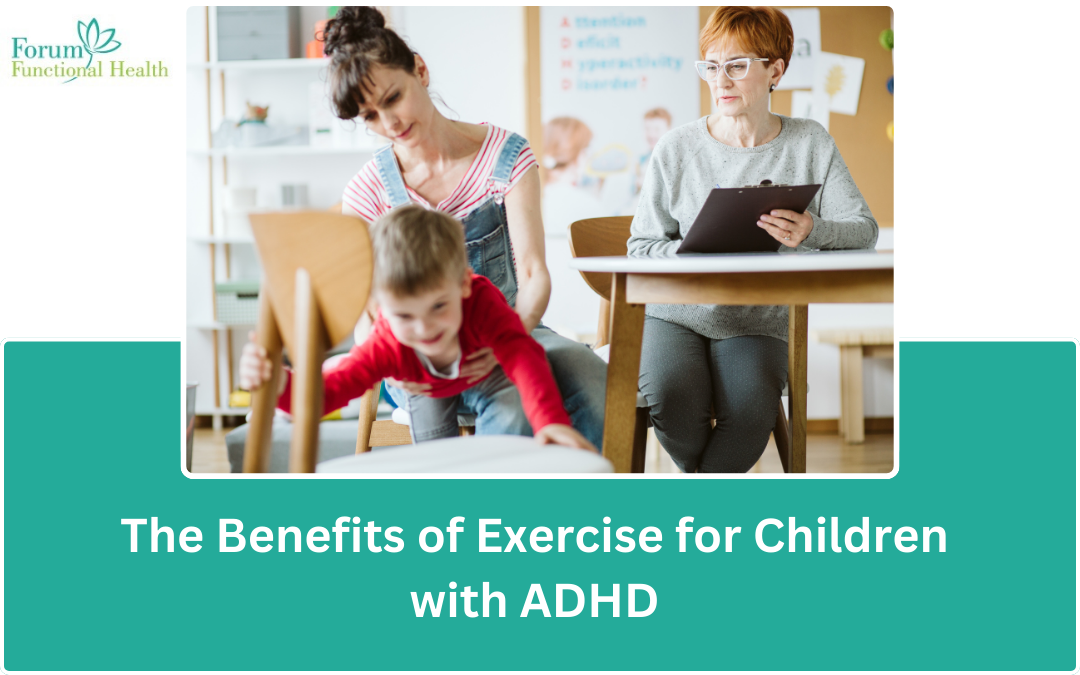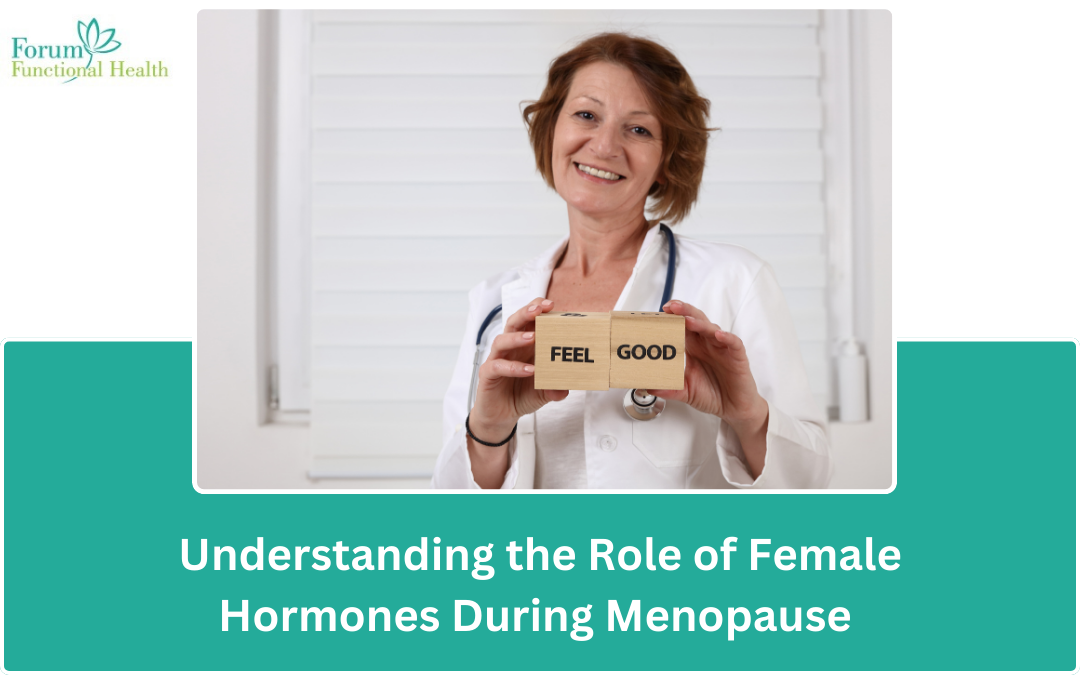
by Forum Functional Health Center | Mar 29, 2024 | Digestive Health
In today’s fast-paced world, maintaining good digestive health is essential for overall well-being. From improved nutrient absorption to better gut motility, exercise plays a crucial role in enhancing the function of your digestive system. In this comprehensive guide, we’ll explore the myriad ways in which exercise can benefit your digestive health.
Your digestive system is responsible for breaking down food, absorbing nutrients, and eliminating waste from the body. However, various factors such as poor diet, stress, and sedentary lifestyle can negatively impact its function. Fortunately, regular exercise can counteract these effects and promote optimal digestive health.
Understanding the Digestive System
Before delving into the benefits of exercise, let’s briefly discuss the key components of the digestive system. It consists of several organs, including the mouth, esophagus, stomach, small intestine, large intestine, liver, gallbladder, and pancreas. Each plays a unique role in the digestion and absorption of nutrients
The Link between Exercise and Digestive Health
Improved Gut Motility
One of the primary benefits of exercise on the digestive system is improved gut motility. Physical activity helps stimulate the muscles of the gastrointestinal tract, promoting more efficient movement of food through the digestive system. This can prevent issues such as constipation and bloating, ensuring regular bowel movements.
Enhanced Nutrient Absorption
Exercise also enhances nutrient absorption in the intestines. By increasing blood flow to the digestive organs, it improves the delivery of nutrients to cells throughout the body. This can lead to better nutrient uptake and utilization, supporting overall health and vitality.
Reduction in Digestive Disorders
Regular exercise has been shown to reduce the risk of various digestive disorders, including acid reflux, irritable bowel syndrome (IBS), and inflammatory bowel disease (IBD). It helps maintain a healthy balance of gut bacteria and strengthens the intestinal barrier, reducing inflammation and promoting gut health.
Regulation of Bowel Movements
Consistent exercise can help regulate bowel movements and prevent constipation. It stimulates the natural contractions of the colon, making it easier to pass stool. Additionally, staying hydrated and consuming an adequate amount of fiber-rich foods can further support regularity.
Types of Exercises for Better Digestion
Aerobic Exercises
Aerobic exercises such as walking, jogging, cycling, and swimming are excellent choices for promoting digestive health. They increase heart rate and breathing rate, promoting circulation and oxygenation of tissues, including those in the digestive system.
Strength Training
Strength training exercises, including weightlifting and resistance training, can also benefit digestion. They help build muscle mass, which in turn increases metabolism and supports healthy digestion. Additionally, strength training can improve posture, reducing the risk of gastrointestinal issues such as acid reflux.
Yoga and Stretching
Yoga and stretching exercises focus on flexibility, relaxation, and stress reduction, all of which are beneficial for digestive health. Certain yoga poses target the abdominal area, promoting digestion and relieving symptoms of indigestion and bloating. Moreover, practicing mindfulness and deep breathing techniques during yoga can help alleviate stress, which is known to negatively impact digestion.
Tips for Incorporating Exercise into Your Routine
- To reap the maximum benefits for your digestive health, consider the following tips for incorporating exercise into your daily routine:
- Start slowly and gradually increase the intensity and duration of your workouts.
- Choose activities that you enjoy to make exercise more sustainable and enjoyable.
- Aim for at least 150 minutes of moderate-intensity exercise or 75 minutes of vigorous-intensity exercise per week.
- Incorporate a mix of aerobic, strength training, and flexibility exercises for overall health
- Stay hydrated before, during, and after exercise to support digestion and prevent dehydration
Forum Functional Health care emphasizes the pivotal role of exercise in fostering digestive health. Through improved gut motility, enhanced nutrient absorption, minimized risk of digestive disorders, and regulated bowel movements, individuals can achieve optimal digestive function and overall well-being. By integrating regular physical activity into daily routines and embracing a balanced diet, Forum Functional Healthcare advocates a holistic approach to nurturing digestive health, empowering individuals to take proactive steps towards a healthier lifestyle.

by Forum Functional Health Center | Mar 28, 2024 | Children with Hyperactivity & ADHD
Attention Deficit Hyperactivity Disorder (ADHD) is a neurodevelopmental disorder that affects millions of children worldwide, impacting their ability to focus, control impulses, and regulate energy levels. While medication and therapy are commonly used treatments, research suggests that exercise can also play a significant role in managing ADHD symptoms. In this blog, we’ll delve into the benefits of exercise for children with ADHD, exploring how physical activity can enhance focus, mood, and overall well-being.
Improved Focus and Concentration
Regular exercise has been shown to boost cognitive function, including attention and concentration, which are areas often affected by ADHD. When children engage in physical activity, they experience increased blood flow to the brain, promoting the release of neurotransmitters like dopamine and serotonin, which are essential for attention regulation. Studies have found that even a single session of moderate-intensity exercise can lead to immediate improvements in attention and focus, making it a valuable tool for managing ADHD symptoms in children.
Regulation of Energy Levels
One of the hallmark characteristics of ADHD is hyperactivity, where children often struggle to channel their excess energy appropriately. Exercise provides a constructive outlet for this energy, helping children with ADHD regulate their activity levels and reduce impulsivity. Activities such as running, cycling, or playing team sports not only burn off excess energy but also teach children valuable skills such as self-control and discipline, which can translate into better behavior both at home and in school.
Mood Enhancement and Stress Reduction
Children with ADHD are more susceptible to mood swings, anxiety, and stress due to the challenges they face in managing their symptoms. Exercise acts as a natural mood enhancer, stimulating the production of endorphins, which are known as the body’s “feel-good” chemicals. By engaging in regular physical activity, children with ADHD can experience reduced levels of anxiety and stress, leading to improved emotional well-being and resilience. Additionally, participating in sports or group activities provides opportunities for social interaction and peer support, further boosting mood and self-esteem.
Better Sleep Quality
Sleep problems are common among children with ADHD, with difficulties falling asleep and staying asleep being prevalent issues. Regular exercise can help regulate sleep patterns by promoting relaxation and reducing insomnia symptoms. Physical activity during the day helps to expend energy reserves, making it easier for children to unwind and fall asleep at night. Moreover, the release of serotonin during exercise can contribute to a more restful and deeper sleep, allowing children to wake up feeling refreshed and ready to face the day ahead.
Enhanced Brain Function and Academic Performance
Exercise not only benefits physical health but also has positive effects on cognitive function and academic performance. Research has shown that children who engage in regular physical activity demonstrate improved memory, problem-solving skills, and academic achievement compared to their less active counterparts. By incorporating exercise into their daily routine, children with ADHD can optimize brain function, leading to better focus, retention of information, and overall academic success.
Incorporating exercise into the daily routine of children with ADHD can significantly contribute to their overall health and well-being. As healthcare professionals, it’s crucial to educate parents and caregivers about the importance of physical activity in managing ADHD symptoms. Additionally, collaborating with schools and community organizations to provide accessible opportunities for children with ADHD to engage in sports and recreational activities can further support their development and success. Together, we can empower children with ADHD to thrive and reach their full potential through the power of exercise.
Forum Functional Health Care as healthcare professionals, it’s imperative that we recognize the pivotal role exercise plays in the holistic management of ADHD. By advocating for the integration of physical activity into the daily lives of children with ADHD, we not only address their immediate symptoms but also promote long-term well-being and success. Through collaborative efforts with parents, schools, and community organizations, we can create environments that facilitate regular physical activity and empower children with ADHD to lead fulfilling lives.

by Forum Functional Health Center | Mar 27, 2024 | Depression
In the journey to combat depression, adopting healthy eating habits can serve as a powerful tool to uplift mood and promote overall well-being. By nourishing your body with nutritious foods, you can fuel your brain and body with the essential nutrients it needs to function optimally. In this comprehensive guide, we’ll explore practical strategies to cultivate healthy eating habits that not only boost mood but also aid in the fight against depression.
The Connection Between Diet and Depression
Scientific research has established a strong connection between diet and mental health. Certain nutrients play crucial roles in neurotransmitter function, brain structure, and overall mood regulation. Conversely, diets high in processed foods, sugar, and unhealthy fats have been linked to an increased risk of depression and other mental health disorders.
Key Nutrients for Mental Health
To support your mental health and combat depression, focus on incorporating nutrient-rich foods into your diet. Here are some key nutrients and the foods rich in them:
Omega-3 Fatty Acids: Found in fatty fish like salmon, walnuts, flaxseeds, and chia seeds, omega-3 fatty acids have been shown to reduce inflammation in the brain and improve mood.
Complex Carbohydrates: Whole grains like brown rice, quinoa, and oats provide a steady source of glucose to the brain, promoting stable mood and energy levels.
Antioxidants: Colorful fruits and vegetables, such as berries, leafy greens, and bell peppers, are rich in antioxidants that help protect the brain from oxidative stress and inflammation.
Protein: Lean sources of protein like chicken, turkey, tofu, and beans contain amino acids that are essential for neurotransmitter synthesis, contributing to improved mood regulation.
Vitamins and Minerals: Ensure adequate intake of vitamins and minerals like vitamin D, B vitamins, magnesium, and zinc, which play roles in neurotransmitter production and mood stabilization.
Practical Tips for Healthy Eating
Incorporating these nutrient-rich foods into your diet doesn’t have to be daunting. Here are some practical tips to help you cultivate healthy eating habits:
Plan Ahead: Take time to plan your meals for the week, including a variety of fruits, vegetables, whole grains, lean proteins, and healthy fats.
Cook at Home: Cooking your meals allows you to have full control over the ingredients and cooking methods, ensuring that you’re nourishing your body with wholesome foods.
Eat Mindfully: Pay attention to your hunger and fullness cues, and savor each bite by eating slowly and without distractions.
Stay Hydrated: Drink plenty of water throughout the day to stay hydrated, as dehydration can negatively impact mood and cognitive function.
Limit Processed Foods: Minimize your intake of processed and sugary foods, as they can lead to fluctuations in blood sugar levels and exacerbate mood swings.
Seek Support: Surround yourself with a supportive community of friends, family, or a professional healthcare team who can encourage and guide you on your journey to better health.
Forum Functional Health Care
As you embark on your journey to cultivate healthy eating habits and fight depression, consider joining Forum Functional Health Care, you can connect with like-minded individuals, share experiences, and gain valuable insights and support from experts in nutrition, mental health, and holistic healing modalities.
At Forum Functional Health Care, we believe in the power of community to inspire positive change and promote well-being in mind, body, and spirit. Join us today and take the first step towards a happier, healthier life.
In conclusion, cultivating healthy eating habits is an integral part of managing depression and promoting mental wellness. By nourishing your body with nutrient-rich foods and adopting mindful eating practices, you can boost mood, increase energy levels, and enhance overall quality of life. Remember, small changes in your diet can lead to significant improvements in your mental and emotional well-being. Take charge of your health today and embark on the journey to a brighter tomorrow. Contact Forum Functional Health in Texas.
Read More: Effective Hormone Treatments for Women with Hormonal Imbalances

by Forum Functional Health Center | Mar 22, 2024 | Infertility
In the journey toward parenthood, understanding the intricate relationship between diet, nutrition, and fertility is paramount. The choices we make in our daily dietary habits can significantly influence women’s fertility. By delving into how diet and nutrition intersect with fertility, we unveil a pathway toward optimizing reproductive health and increasing the likelihood of conception.
Nourishing the Body for Fertility
Ensuring proper nourishment lays the foundation for optimal fertility. A diet rich in essential nutrients provides the body with the building blocks necessary for reproductive health. Nutrient-dense foods such as fruits, vegetables, whole grains, and lean proteins support hormonal balance and promote reproductive function.
Adequate intake of vitamins and minerals, including folate, iron, and zinc, is particularly crucial for women’s fertility. These nutrients contribute to egg health, hormone regulation, and overall reproductive well-being.
Balancing Hormones through Diet
Hormonal balance is key to fertility, and diet plays a pivotal role in regulating hormonal levels. Certain foods can impact hormone production and metabolism, influencing fertility outcomes. For instance, consuming omega-3 fatty acids found in fatty fish can help regulate menstrual cycles and improve ovulation.
On the other hand, excessive consumption of processed foods high in refined sugars and unhealthy fats can disrupt hormonal balance, potentially impairing fertility. Striving for a balanced diet rich in whole foods can help maintain optimal hormone levels and support reproductive health.
Managing Weight for Fertility Optimization
Weight management is intricately linked to fertility, with both underweight and overweight conditions posing challenges to conception. Achieving and maintaining a healthy weight through balanced nutrition and regular physical activity is crucial for optimizing fertility.
Excess body fat can disrupt hormone production and ovulation, leading to irregular menstrual cycles and decreased fertility. Conversely, being underweight can also impact hormonal balance, potentially hindering ovulation and conception. By adopting a balanced diet and lifestyle, women can support their fertility journey by maintaining a healthy weight.
Enhancing Egg Quality and Ovulation
The quality of eggs released during ovulation is a critical factor in fertility outcomes. Diet and nutrition can significantly influence egg quality, thereby impacting the chances of successful conception.
Antioxidant-rich foods such as berries, leafy greens, and nuts can help protect eggs from oxidative stress and improve overall egg quality. Additionally, incorporating fertility-boosting nutrients like coenzyme Q10 and L-arginine into the diet can support ovarian function and enhance ovulation.
Addressing Nutritional Deficiencies
Nutritional deficiencies can undermine fertility health, highlighting the importance of addressing any gaps in dietary intake. Consulting with a healthcare provider or fertility specialist can help identify potential deficiencies and develop personalized dietary strategies to address them.
Common nutrient deficiencies that may impact fertility include iron, vitamin D, and folate. By optimizing nutrient intake through dietary modifications or supplementation, women can address underlying nutritional imbalances and support their fertility journey.
Fueling Fertility with Super foods
Certain foods are renowned for their fertility-boosting properties, earning them the title of “superfoods” in the realm of reproductive health. These nutrient-packed foods offer a concentrated source of essential vitamins, minerals, and antioxidants, promoting fertility and supporting reproductive function.
Examples of fertility superfoods include
Wild-caught Salmon: Rich in omega-3 fatty acids and protein, salmon supports hormone production and enhances fertility.
Avocado: Loaded with healthy fats and potassium, avocado promotes hormonal balance and reproductive health.
Spinach: Packed with iron, folate, and antioxidants, spinach supports ovulation and improves egg quality.
Incorporating these superfoods into a balanced diet can amplify fertility potential and optimize reproductive outcomes.
Seeking Professional Guidance
Forum Functional Health Care emphasizes the crucial role of dietary modifications in positively impacting fertility. While acknowledging the significance of this aspect, it underscores the necessity of seeking professional guidance from healthcare providers or registered dieticians. These experts are equipped to offer personalized recommendations tailored to individual needs and can address any underlying health concerns that may affect fertility.
By collaborating with a healthcare team, women can navigate their fertility journey with confidence, knowing they are receiving expert guidance. This approach allows for the optimization of chances of conceiving successfully.
Understanding the profound impact of diet and nutrition on women’s fertility empowers individuals to make informed choices that support reproductive health. By prioritizing nutrient-dense foods, balancing hormones, managing weight, and addressing nutritional deficiencies, women can optimize their fertility potential and embark on their journey toward parenthood with confidence.
It’s important to remember that each woman’s fertility journey is unique, and seeking professional guidance can provide personalized support tailored to individual needs. With the right approach to diet and nutrition, women can boost their chances of conception and embark on the rewarding path to parenthood.

by Forum Functional Health Center | Mar 20, 2024 | Fatigue
In today’s fast-paced world, fatigue has become a common complaint for many individuals. Whether it’s due to hectic schedules, poor sleep habits, or high stress levels, feeling constantly tired can significantly impact our overall well-being and productivity. Fortunately, there are several strategies you can incorporate into your daily routine to combat fatigue and boost your energy levels effectively.
1. Prioritize Quality Sleep
One of the most crucial factors in combating fatigue is ensuring you get adequate and restful sleep. Aim for 7-9 hours of uninterrupted sleep each night, and establish a consistent sleep schedule to regulate your body’s internal clock. Create a relaxing bedtime routine, minimize exposure to screens before bed, and ensure your sleep environment is comfortable and conducive to rest.
2. Stay Hydrated
Dehydration can contribute to feelings of fatigue and lethargy. Make it a habit to drink plenty of water throughout the day to stay hydrated. Avoid excessive consumption of caffeinated or sugary beverages, as they can lead to energy crashes later on. Herbal teas and infused water are excellent alternatives to keep you hydrated and refreshed.
3. Maintain a Balanced Diet
Nutrition plays a significant role in energy levels and overall health. Focus on consuming a balanced diet rich in fruits, vegetables, whole grains, lean proteins, and healthy fats. Avoid relying on processed foods and sugary snacks, as they can cause fluctuations in blood sugar levels and energy crashes. Incorporate regular meals and snacks to sustain energy levels throughout the day.
4. Engage in Regular Exercise
Regular physical activity is essential for improving energy levels and combating fatigue. Aim for at least 30 minutes of moderate exercise most days of the week. Find activities you enjoy, whether it’s walking, jogging, cycling, or yoga, and make them a regular part of your routine. Exercise helps increase circulation, release endorphins, and improve overall energy and mood.
5. Manage Stress
Chronic stress can drain your energy reserves and leave you feeling exhausted. Practice stress management techniques such as deep breathing, meditation, yoga, or mindfulness to help reduce stress levels and promote relaxation. Prioritize activities that bring you joy and relaxation, and learn to delegate tasks or say no when necessary to avoid burnout.
6. Take Regular Breaks
Allow yourself time to rest and recharge throughout the day by taking short breaks. Stand up, stretch, or go for a brief walk to combat the effects of prolonged sitting and improve circulation. Break up tasks into smaller, manageable chunks to prevent mental fatigue and maintain focus and productivity.
7. Limit Screen Time
Excessive screen time, particularly before bed, can disrupt sleep patterns and contribute to feelings of fatigue. Set boundaries on your screen usage and establish a digital curfew before bedtime. Engage in relaxing activities such as reading, listening to music, or practicing gratitude instead of scrolling through your phone or computer.
8. Practice Good Posture
Poor posture can lead to muscle tension, fatigue, and decreased energy levels. Pay attention to your posture throughout the day, whether sitting at a desk, standing, or walking. Sit up straight, keep your shoulders relaxed, and avoid slouching to prevent unnecessary strain on your muscles and joints.
9. Seek Social Support
Maintaining strong social connections is essential for mental and emotional well-being, which can directly impact energy levels. Spend time with friends and family members who uplift and support you, and engage in meaningful conversations and activities together. Socializing can help reduce stress, boost mood, and increase feelings of energy and vitality.
10. Consider Professional Help
If fatigue persists despite implementing lifestyle changes, consider seeking advice from a healthcare professional. Chronic fatigue could be a symptom of an underlying medical condition such as sleep disorders, thyroid dysfunction, or vitamin deficiencies. A healthcare provider can help identify the root cause of your fatigue and recommend appropriate treatment options.
Incorporating these strategies into your daily routine can help combat fatigue and boost your energy levels naturally. Remember that consistency is key, and small changes over time can lead to significant improvements in your overall well-being. By prioritizing quality sleep, nutrition, exercise, stress management, and self-care, you can reclaim your energy and vitality to live life to the fullest.
For personalized guidance on optimizing your energy levels and overall health, consider scheduling a consultation with our team at Forum Functional Health Center. Our experienced healthcare professionals can provide individualized recommendations and support to help you achieve your wellness goals. Don’t let fatigue hold you back – take charge of your health and vitality today.

by Forum Functional Health Center | Mar 18, 2024 | Hormone Health
Menopause marks a significant transition in a woman’s life, characterized by the cessation of menstrual cycles and the onset of various physical and emotional changes. At the heart of this transformative phase lie fluctuations in female hormones, namely estrogen and progesterone, which play pivotal roles in regulating numerous bodily functions. Understanding the intricate interplay of theses hormone during menopause is key to managing its symptoms effectively and promoting overall well-being.
The Role of Female Hormones during Menopause
Menopause typically occurs between the ages of 45 and 55, signaling the end of reproductive capacity. Central to this process is the decline in ovarian function, leading to decreased production of estrogen and progesterone. These hormonal shifts give rise to a myriad of symptoms, ranging from hot flashes and night sweats to mood swings and vaginal dryness.
Estrogen, known as the primary female sex hormone, exerts widespread effects on the body, influencing bone health, cardiovascular function, cognitive function, and more. As estrogen levels decline during menopause, women may experience bone loss, increased risk of heart disease, cognitive changes, and urogenital issues.
Progesterone, another key hormone, helps regulate the menstrual cycle and supports pregnancy. During menopause, progesterone production also dwindles, contributing to irregular periods and other symptoms associated with hormonal imbalance.
Managing Menopausal Symptoms Naturally
while menopause is a natural phase of life, the associated symptoms can significantly impact quality of life for many women. Fortunately, several strategies can help alleviate these symptoms and support overall health during this transitional period.
1. Lifestyle Modifications
Healthy Diet: Emphasize a balanced diet rich in fruits, vegetables, whole grains, lean proteins, and healthy fats. Incorporate foods high in calcium and vitamin D to support bone health.
Regular Exercise: Engage in regular physical activity, including aerobic exercise, strength training, and flexibility exercises, to improve mood, alleviate stress, and maintain bone density.
Stress Management: Practice relaxation techniques such as deep breathing, meditation, yoga, or tai chi to reduce stress levels and promote emotional well-being.
2. Herbal Remedies and Supplements:
Black Cohosh: Widely used for relieving hot flashes and other menopausal symptoms, black cohosh is a botanical remedy with estrogen-like properties.
Soy Isoflavones: Found in soybeans and soy products, isoflavones may help alleviate hot flashes and support cardiovascular health.
Dong Quai: Used in traditional Chinese medicine, dong quai is believed to balance hormone levels and ease menopausal symptoms.
Omega-3 Fatty Acids: Omega-3 supplements, derived from sources like fish oil or flaxseed oil, may help reduce inflammation and support heart health during menopause.
3. Hormone Replacement Therapy (HRT)
HRT involves supplementing estrogen or estrogen-progestin combinations to alleviate menopausal symptoms. While effective for symptom relief, HRT carries certain risks and is not suitable for all women. It’s essential to discuss the potential benefits and risks with a healthcare provider.
Seeking Support at Forum Functional Health Center
At Forum Functional Health Center, we understand the unique challenges women face during menopause and offer comprehensive support to help them navigate this transitional phase with confidence and vitality. Our team of experienced healthcare professionals provides personalized guidance and evidence-based interventions to address menopausal symptoms holistically.
Through a blend of natural approaches, including nutritional counseling, lifestyle modifications, targeted supplementation, and personalized exercise regimens, we empower women to optimize their health and well-being during menopause and beyond. Our integrative approach considers the individual needs and preferences of each patient, ensuring tailored solutions that prioritize safety, efficacy, and long-term health outcomes.
Whether you’re seeking relief from hot flashes, support for bone health, or guidance on hormone replacement options, our team is here to support you every step of the way. Together, we’ll embark on a journey towards renewed vitality, enhanced resilience, and vibrant health during this transformative stage of life.
Understanding the role of female hormones during menopause is essential for effectively managing its symptoms and promoting overall health and well-being. By adopting a holistic approach that encompasses lifestyle modifications, herbal remedies, supplements, and personalized support from healthcare professionals like those at Forum Functional Health Center, women can embrace menopause as a natural transition and thrive with vitality and resilience.

by Forum Functional Health Center | Mar 15, 2024 | Erectile Dysfunction
Erectile dysfunction (ED) is a common condition affecting millions of men worldwide, with various factors contributing to its onset. While medications and treatments exist, prevention through lifestyle modifications, particularly regular exercise, holds significant promise. In this informative blog, we delve into the importance of regular exercise in preventing erectile dysfunction and explore how incorporating physical activity into one’s routine can lead to better sexual health.
The Link Between Exercise and Erectile Dysfunction
Research has shown a clear link between regular exercise and a reduced risk of erectile dysfunction. Engaging in physical activity promotes cardiovascular health, improves blood circulation, and helps maintain optimal hormone levels—all of which are essential for erectile function. By strengthening the heart and blood vessels, exercise enhances blood flow to the penis, facilitating erections. Moreover, physical activity plays a crucial role in reducing the risk factors associated with ED, such as obesity, high blood pressure, and diabetes.
Understanding the Mechanisms
The mechanisms underlying the benefits of exercise for erectile function are multifaceted. Firstly, regular physical activity improves endothelial function, which is essential for the dilation of blood vessels and the delivery of adequate blood flow to the penis during arousal. Secondly, exercise helps regulate hormone levels, including testosterone, which is crucial for libido and sexual function. Additionally, maintaining a healthy weight through exercise can prevent obesity, a major risk factor for erectile dysfunction.
Types of Exercise and Their Impact
Various forms of exercise can contribute to better erectile health. Aerobic exercises, such as jogging, swimming, or cycling, are particularly beneficial for cardiovascular health and blood circulation. Strength training exercises, including weightlifting or resistance training, can also improve muscle mass and overall physical fitness, indirectly benefiting erectile function. Additionally, activities that promote flexibility and relaxation, such as yoga or tai chi, can help reduce stress and anxiety, which are common contributors to ED.
The Psychological Aspect
In addition to its physiological benefits, exercise also has a positive impact on mental health, which can influence sexual function. Regular physical activity helps reduce stress, anxiety, and depression—psychological factors often associated with erectile dysfunction. By promoting feelings of well-being and boosting self-confidence, exercise can enhance sexual performance and satisfaction.
Incorporating Exercise into Daily Life
Making exercise a regular part of one’s routine is essential for preventing erectile dysfunction. Incorporating physical activity into daily life can be achieved through simple yet effective strategies, such as taking brisk walks, using stairs instead of elevators, or engaging in recreational sports. Setting realistic goals and finding activities that are enjoyable can help maintain long-term adherence to an exercise regimen.
The Role of Diet and Lifestyle
While exercise plays a significant role, adopting a holistic approach to health is essential for preventing erectile dysfunction. A balanced diet rich in fruits, vegetables, lean proteins, and whole grains provides essential nutrients that support sexual health. Avoiding excessive alcohol consumption and quitting smoking are also important lifestyle modifications that can positively impact erectile function.
Stress Management Techniques
Chronic stress can take a toll on both physical and mental health, contributing to erectile dysfunction. Incorporating stress management techniques, such as mindfulness meditation, deep breathing exercises, or relaxation techniques, can help alleviate stress and promote relaxation, thus improving sexual function. Finding healthy outlets for stress, such as hobbies or social activities, can also be beneficial.
Forum Functional Healthcare Approach
Regular exercise is crucial for preventing erectile dysfunction and maintaining overall sexual health. By improving cardiovascular function, regulating hormone levels, and reducing risk factors associated with ED, exercise offers a multifaceted approach to enhancing erectile function. However, it is important to remember that lifestyle modifications, such as adopting a healthy diet, regular exercise, and stress management techniques, are key components of a comprehensive approach to erectile dysfunction prevention. By prioritizing these lifestyle changes, men can take proactive steps toward optimizing their sexual health and overall well-being.
Lifestyle modifications, such as adopting a healthy diet, regular exercise, and stress management techniques, can significantly improve erectile function. Integrating these practices into daily life can contribute to better overall health and well-being. Additionally, seeking support from healthcare professionals, such as urologists or sexual health specialists, can provide personalized guidance and treatment options for erectile dysfunction. By taking a proactive approach to health and addressing underlying lifestyle factors, individuals can empower themselves to optimize their sexual health and quality of life.
At Forum Functional Health Center, we prioritize a holistic approach to wellness, offering comprehensive support and resources to help individuals achieve their health goals. Our team of experts collaborates with patients to develop personalized treatment plans that incorporate lifestyle modifications, medical interventions, and ongoing support to enhance overall well-being and sexual health.

by Forum Functional Health Center | Mar 13, 2024 | Low Testosterone
Low testosterone, often referred to as low T, is a condition that affects many men as they age. Testosterone is a hormone primarily produced in the testicles and is crucial for various bodily functions, including muscle mass, bone density, sperm production, and sex drive. When testosterone levels drop below normal, it can have significant implications for men’s health and overall well-being. In this blog, we will delve into the effects of low testosterone and explore how it can impact men’s health.
Effects on Physical Health
One of the most noticeable effects of low testosterone is its impact on physical health. Men with low T may experience a decrease in muscle mass and strength, making it harder to perform everyday tasks and maintain an active lifestyle. Additionally, low testosterone levels can lead to an increase in body fat, particularly around the abdomen, which is associated with a higher risk of cardiovascular disease and type 2 diabetes.
Low testosterone can affect bone density, putting men at a greater risk of osteoporosis and fractures. This is because testosterone plays a crucial role in maintaining bone health by stimulating bone growth and preventing bone loss. Therefore, men with low T may be more susceptible to bone-related issues as they age.
Effects on Sexual Health
Testosterone plays a significant role in regulating libido (sex drive) and erectile function in men. Therefore, low testosterone levels can lead to a decreased interest in sex and difficulty achieving or maintaining erections. This can have a profound impact on intimate relationships and overall quality of life.
Low testosterone can contribute to other sexual health issues, such as infertility and reduced sperm production. Testosterone is essential for the development and maturation of sperm cells, so low levels of this hormone can impair fertility and decrease the chances of conception.
Effects on Mental Health
In addition to its physical and sexual effects, low testosterone can also impact mental health and emotional well-being. Many men with low T report symptoms such as fatigue, irritability, and depression. These mood changes can significantly impact daily functioning and overall happiness.
Moreover, testosterone plays a role in cognitive function, including memory, concentration, and spatial awareness. Therefore, men with low testosterone may experience difficulties with memory retention and mental clarity, affecting their ability to perform tasks that require focus and attention.
Treatment Options
Fortunately, there are several treatment options available for men with low testosterone. Testosterone replacement therapy (TRT) is the most common approach and involves administering synthetic testosterone either through injections, patches, gels, or pellets. TRT can help restore testosterone levels to normal and alleviate symptoms such as low libido, fatigue, and muscle loss.
However, it’s essential to consult with a healthcare professional before starting TRT, as it may not be suitable for everyone. They will conduct a thorough evaluation to determine the underlying cause of low testosterone and recommend the most appropriate treatment approach based on individual needs and health status.
Forum Functional Health Care
For men struggling with low testosterone and its associated health issues, finding support and guidance is crucial. At Forum Functional Health Care, we specialize in holistic approaches to men’s health, including hormone optimization and lifestyle interventions.
Our team of experienced healthcare providers understands the complex interplay between hormones, nutrition, exercise, and mental well-being. We offer personalized treatment plans tailored to each individual’s unique needs, addressing the root cause of low testosterone and promoting long-term health and vitality.
Through a combination of medical expertise, cutting-edge diagnostics, and ongoing support, we empower men to reclaim their health and optimize their quality of life. If you’re experiencing symptoms of low testosterone or simply want to learn more about how to improve your overall health and well-being, we’re here to help.
Low testosterone can have a profound impact on men’s health, affecting physical, sexual, and mental well-being. However, with the right treatment and support, men can effectively manage low T and improve their quality of life. Whether through testosterone replacement therapy or holistic interventions, it’s essential to address the underlying causes of low testosterone and take proactive steps towards better health. At Forum Functional Health Care, we’re committed to helping men thrive at every stage of life, providing comprehensive care and support for optimal health and vitality.

by Forum Functional Health Center | Mar 11, 2024 | Polycystic ovary syndrome (PCOS)
Polycystic Ovary Syndrome (PCOS) is a common hormonal disorder affecting women of reproductive age. Characterized by irregular periods, excessive androgen levels, and cysts in the ovaries, PCOS can lead to various complications, including infertility, diabetes, and heart disease. While managing PCOS can be challenging, regular check-ups play a pivotal role in monitoring and addressing its symptoms effectively. In this comprehensive guide, we’ll delve into the importance of regular check-ups for women with PCOS and explore holistic approaches to managing this condition.
Understanding PCOS: A Complex Interplay of Factors
PCOS is a multifaceted condition with various underlying factors contributing to its manifestation. Genetics, insulin resistance, and hormonal imbalances are among the primary culprits. Without proper management, PCOS can significantly impact a woman’s quality of life and increase the risk of long-term health complications.
Importance of Regular Check-ups
Regular check-ups are essential for women with PCOS to monitor their overall health and manage the condition proactively. Here’s why these check-ups are crucial:
Early Detection of Complications: Regular visits to healthcare providers enable early detection of potential complications associated with PCOS, such as diabetes, high blood pressure, and cardiovascular disease. Timely intervention can prevent these complications from worsening and improve long-term outcomes.
Hormonal Balance Monitoring: PCOS is characterized by hormonal imbalances, including elevated levels of androgens such as testosterone. Regular check-ups allow healthcare professionals to monitor hormone levels and adjust treatment strategies accordingly to restore hormonal balance.
Evaluation of Reproductive Health: For women with PCOS who are trying to conceive, regular check-ups are vital for assessing reproductive health. Healthcare providers can track ovulation patterns, evaluate ovarian function, and offer guidance on fertility treatments if needed.
Lifestyle Modifications: Lifestyle factors such as diet, exercise, and stress management play a significant role in managing PCOS symptoms. During check-ups, healthcare professionals can provide personalized recommendations for lifestyle modifications to improve overall health and alleviate PCOS symptoms.
Medication Management: Many women with PCOS require medications to regulate menstrual cycles, manage insulin resistance, or induce ovulation. Regular check-ups ensure that medication regimens are appropriately prescribed and adjusted based on individual needs and treatment responses.
Holistic Approaches to PCOS Management
In addition to conventional medical interventions, holistic approaches can complement PCOS treatment and promote overall well-being. Here are some holistic strategies that women with PCOS may incorporate into their healthcare regimen:
Nutritional Guidance: A balanced diet rich in whole foods, lean proteins, and healthy fats can help stabilize blood sugar levels and improve insulin sensitivity in women with PCOS. Consulting with a registered dietitian or nutritionist can provide personalized dietary recommendations tailored to individual needs.
Regular Exercise: Physical activity is crucial for managing weight, reducing insulin resistance, and improving cardiovascular health in women with PCOS. Incorporating a combination of aerobic exercise, strength training, and flexibility exercises into a weekly routine can yield significant benefits.
Stress Management: Chronic stress can exacerbate PCOS symptoms by increasing cortisol levels and disrupting hormone balance. Techniques such as mindfulness meditation, yoga, and deep breathing exercises can help manage stress and promote relaxation.
Supplement Support: Certain supplements, such as omega-3 fatty acids, vitamin D, and inositol, may offer benefits for women with PCOS by addressing specific nutritional deficiencies and supporting metabolic health. However, it’s essential to consult with a healthcare provider before starting any supplements to ensure safety and efficacy.
Community Engagement: Joining support groups or online forums dedicated to PCOS can provide valuable emotional support, practical tips, and a sense of community for women navigating the challenges of this condition. Sharing experiences and insights with others can foster empowerment and resilience.
Forum Functional Health Center Holistic Treatments in Focus
At the Forum Functional Health Center, our approach to PCOS management encompasses a comprehensive array of holistic treatments aimed at addressing the root causes of the condition and optimizing overall health and well-being.
Root Causes and Forum Dialogue
In our forums, we delve into the underlying root causes of PCOS, including insulin resistance, inflammation, and genetic predispositions. Through open dialogue and expert insights, we explore integrative approaches to addressing these root causes and restoring balance to the body.
Supplement-Based Solutions
Supplements can play a supportive role in PCOS management by addressing nutritional deficiencies and supporting metabolic function. In our forums, we discuss evidence-based supplement options and provide guidance on safe and effective usage under the supervision of qualified healthcare professionals.
Community Empowerment and Support
Our forums serve as a hub for community empowerment and support, where women with PCOS can connect with others facing similar challenges, share their journeys, and exchange valuable resources and strategies for managing the condition holistically. Together, we empower each other to take control of our health and thrive despite the obstacles posed by PCOS.
Regular check-ups are indispensable for women with PCOS to monitor their health, manage symptoms, and prevent complications. By adopting a holistic approach that addresses the root causes of PCOS and integrates conventional and complementary therapies, women can empower themselves to lead healthier, more fulfilling lives. Join us at the Functional Health Center forums to explore holistic treatments, engage in insightful dialogue, and find support on your journey to optimal health with PCOS.

by Forum Functional Health Center | Mar 8, 2024 | Thyroid disease
Thyroid disease affects millions worldwide, with conditions such as hypothyroidism and hyperthyroidism presenting unique challenges to individuals’ health and well-being. The thyroid gland plays a crucial role in regulating metabolism, energy levels, and overall bodily functions. When thyroid function is disrupted, it can lead to a range of symptoms, including fatigue, weight fluctuations, mood swings, and more. While medication and lifestyle changes are often part of the treatment plan, incorporating exercise into one’s routine can offer significant benefits for those with thyroid disease.
The Link between Exercise and Thyroid Health
Exercise has been shown to have a profound impact on thyroid health. Regular physical activity helps to improve circulation, boost metabolism, and promote overall hormonal balance all of which are crucial for individuals with thyroid disease. Studies have demonstrated that exercise can enhance thyroid hormone production and sensitivity, leading to improved energy levels, better mood, and weight management. Additionally, exercise can help reduce inflammation in the body, which is often elevated in thyroid conditions, further supporting overall health and well-being.
Tailoring Exercise for Thyroid Patients
When incorporating exercise into a treatment plan for thyroid disease, it’s essential to consider individual needs and limitations. Thyroid patients may experience varying degrees of fatigue and muscle weakness, making high-intensity workouts challenging. Instead, focusing on low-impact exercises such as walking, swimming, yoga, or cycling can provide gentle yet effective forms of physical activity. These activities not only improve cardiovascular health but also help alleviate stress and promote relaxation, which is beneficial for managing thyroid symptoms.
Building Strength and Resilience Through Exercise
Strength training exercises are also valuable for individuals with thyroid disease. Building muscle mass helps boost metabolism and improve overall strength and endurance, combating the fatigue and weakness commonly associated with thyroid conditions. However, it’s essential to start slowly and gradually increase intensity to avoid overexertion. Working with a qualified fitness trainer or physical therapist can help develop a safe and effective strength training program tailored to individual needs and goals.
The Role of Forum Functional Healthcare in Thyroid Management
Forum Functional healthcare approaches thyroid disease from a holistic perspective, addressing underlying imbalances and supporting the body’s natural healing mechanisms. In addition to medication and lifestyle modifications, functional healthcare emphasizes the importance of nutrition, stress management, and exercise in managing thyroid symptoms. By integrating these aspects into a comprehensive treatment plan, functional healthcare providers empower patients to take an active role in their health and well-being, leading to better outcomes and improved quality of life.
Personalized Exercise Plans for Thyroid Patients
One of the key principles of functional healthcare is personalized medicine, recognizing that each individual’s health journey is unique. When it comes to exercise, this means tailoring workouts to fit a person’s specific needs, preferences, and abilities. Whether it’s a gentle yoga routine, a brisk walk in nature, or a strength training session at the gym, the goal is to find activities that are enjoyable and sustainable for the long term. By working closely with patients to develop personalized exercise plans, functional healthcare providers empower individuals to embrace physical activity as an integral part of their thyroid management strategy.
Monitoring Progress and Adjusting Strategies
Incorporating exercise into a thyroid management plan is not a one-size-fits-all approach. It’s essential to monitor progress regularly and adjust strategies as needed based on individual responses and goals. Functional healthcare providers work closely with patients to track symptoms, energy levels, and overall well-being, making modifications to exercise routines as necessary. By taking a proactive and collaborative approach to thyroid management, patients can experience greater success in achieving their health and fitness goals.
The Holistic Benefits of Exercise for Thyroid Health
Beyond its physiological effects, exercise offers holistic benefits for individuals with thyroid disease. Engaging in regular physical activity promotes mental clarity, reduces stress, and enhances overall mood and well-being. By incorporating exercise into their daily routine, thyroid patients can experience a sense of empowerment and control over their health, fostering resilience and a positive outlook on life. With the guidance and support of functional healthcare providers, individuals with thyroid disease can harness the power of exercise to optimize their health and vitality for years to come.
Exercise plays a crucial role in managing thyroid disease and promoting overall health and well-being. By incorporating personalized exercise plans into a comprehensive treatment strategy, individuals with thyroid conditions can experience improved energy levels, better mood, and enhanced quality of life. With the support of functional healthcare providers, patients can embrace physical activity as a powerful tool for managing thyroid symptoms and achieving optimal health and vitality.










